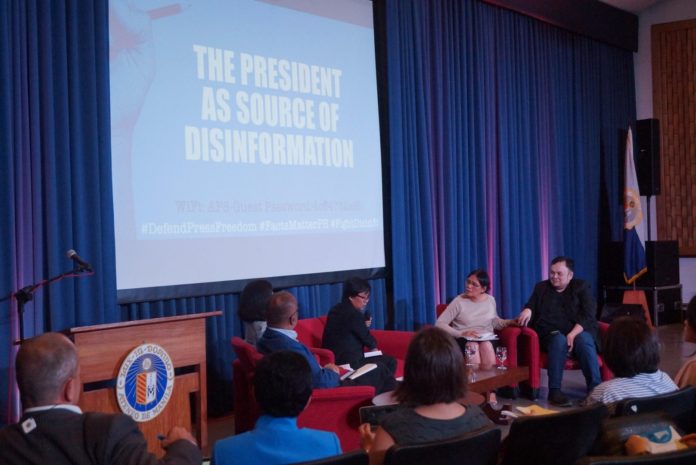MEDIA scholars and journalists said it was time for the press to step away from neutrality, and take the side of the public as they practice their profession under an administration that openly spreads false information.
Cherian George, professor at the Hong Kong Baptist University, said media should “take sides for truth [and] take sides for human rights against demagoguery.”
“When you are faced with popularly elected officials, who systematically and cynically subvert reason to grow their power, there’s a strong case I think for public interest media to get off our neutral fence and take sides,” George said.
George was one of the speakers in the Philippine Daily Inquirer’s two-day media forum titled “Democracy and Disinformation” at the Ateneo de Manila Rockwell campus in Makati last Feb. 12 and 13.
Sweeping statements, contradictions
Since taking office in 2016, President Rodrigo Duterte has been known to give sweeping statements in public, only to contradict himself later on.
Recently, he announced during a Palace meeting with communist rebels that nothing would happen in the country if he would not become a dictator.
In past speeches, he said becoming a dictator would dishonor the memory of her mother–the late Soledad Roa Duterte–a prominent activist during the martial law regime of dictator Ferdinand Marcos.
Diosa Labiste, University of the Philippines professor said that when President Duterte gives false information and statements that encourage impunity, it is the job of media to “debunk, fact-check and denounce” them.
“These [statements] should not be regarded by journalists as one of those ideas that have to be included in the story for balance’s sake, I think they should qualify as statements that are hateful, that are dangerous, or beyond what is acceptable in a democratic society,” Labiste said.
George, however, warned that taking sides could reduce media’s reach to the public as it could lose its “mantle of neutrality.”
“There’s a very real risk that [media] diminishes its own ability to reach out to the nation as a whole because [it will] be seen as offending the fans, supporters of those demagogues,” he said.
For broadcast journalist Ed Lingao, it was inevitable for reporters to have biases in making editorial judgments.
“When we cover an event, we’re already biased. Why did you cover that event? Because that’s editorial judgment. But then that’s bias. Why did you ask this question, why not that? Why did you interview that person, why not that person, ” he said.
‘Fake news law is dangerous’
Former Al Jazeera correspondent Peter Greste said imposing legislation as a solution to fake news would be “dangerous,” saying loose legal definitions can be used to jail journalists.
Greste, who was arrested by Egyptian authorities for his work as a journalist in 2013, added that loose legal technicalities may also be used to silence journalists who are critical of the government.
During the second Senate probe last Jan. 30 on the proliferation of fake news, Sen. Manny Pacquiao said he wanted the government to license bloggers and regulate and “control” the media.
Al Jazeera reporter Jamela Alindogan said engaging government officials in media education was one way to combat “fake news.”
“Engage not just those in universities, but also those in government, those working in local government agencies, those in the provinces. [Engage] them [and get] them informed,” Alindogan said.
‘Palace drama sells’
Ron Jabal, president of Public Relations Society of the Philippines, said Duterte could be using disinformation as a strategy to make more people listen, claiming people were more interested in drama.
“[Journalists] are interested in giving out information, unbiased, objective, but people are not reacting to that. They’re reacting to the drama, to the numbers, to the lies. The campaign that [needs] to be done is not just [giving out] more information but also be behavioral in nature,” Jabal said.
“I think we have to look at communication as a ritual, as drama and that Duterte is not just giving you information but providing you drama and this is also what’s happening on how his supporters interpret his message, that they are performing, they’re not just receiving information,” he added. A.A. D. Suarez
To investigate and expose unspoken issues and anomalies, send confidential news tips to the Special Reports team of the Varsitarian at specialreports.varsitarian@gmail.com or at THE VARSITARIAN office, Rm. 105, Tan Yan Kee Student Center, University of Santo Tomas, España, Manila.

















